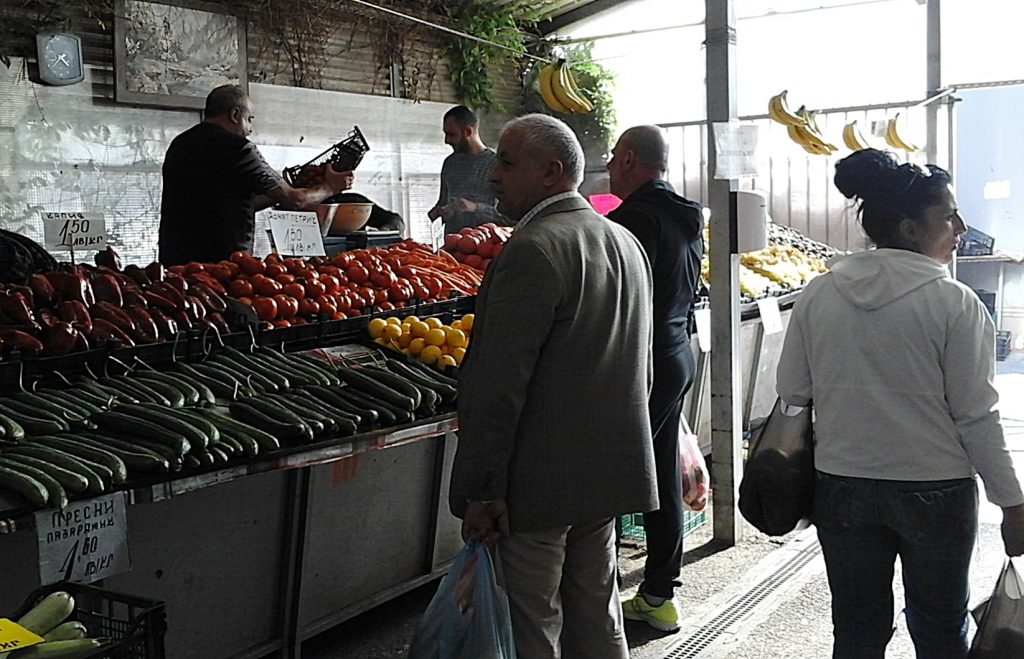Veronica Richards

The early morning mini-bus from Yambol trundles into the village, and drinking a coffee outside the bar the village mayor from a few years back calls out jovially to those of us waiting to board: “Mask!” Unaffronted (you’ll see why in a moment), the majority of us pull from our pocket a crumpled, grubby-ish scrap of ear-looped linen and don it, at least until we reach our seat. “Losho!” laughs the ex-mayor, rocking merrily back and forth on his seat (maybe it was a rakia he was drinking, not coffee), and nobody disagrees. ‘Losho’ can mean anything from ‘bad’ to ‘useless’ to ‘barmy’ which I would say is the majority view now in Bulgaria with regard to mask-wearing.
Masks there are ‘said’ to be mandatory on public transport and in shops, but I discovered by no means everyone wore them except for in some chain stores and in Sofia’s metro, and even there most soon pull them down under their nose (humans feeling better for a free flow of air). This under-nose style one I’m not that averse to for the same reason that men of a certain age start growing a beard: it covers a sagging jaw-line but doesn’t render them faceless.
I arrived in Bulgaria mid Sept and have just returned to the U.K. a month later, most of my time spent in a village (life there returned completely to normal); with an occasional day in the town of Yambol where people sat around in groups in the outdoor cafes as has long been their habit; then back to Sofia by long distance coach, and a day and night in the city before my flight home. By mid-October there was more mask-wearing in the capital than when I arrived, the Health Minister having a couple of days earlier asked for “more compliance”. Nevertheless, unlike here, there was no feeling as I walked around that those who did not comply were being judged , but rather a sense of ‘you’re adult, you can make your own choice’, and I saw not one person in a mask peering over it in that frightened brainwashed way one sees here fairly often as if the mask-wearer truly believes some malevolent nano-size killer is on the hunt out to get them (which if it were, being nano, a mask would be useless anyway, though one doesn’t say).
I didn’t have a television where I was living, but learned from others that although the media in Bulgaria certainly mentions COVID-19, it does not do so incessantly (in that nocebo way favoured by the BBC), and when the virus is talked of, the numbers of those who were in hospital with it but got better are also given print and air space. Recently the prime minister, Boyko Borissov, announced there would be NO MORE LOCKDOWNS in Bulgaria, although he did say that with the coming of winter and the annual flu season, people should take precautions.
“People were frightened in the beginning but now they just want to live a normal life,” a young Bulgarian woman told me, “even the old don’t care anymore, they think if I die I die, I have to die of something, it is better to live life normally.” Such an attitude clearly far less taxing on the immune system than protracted fear, depression, rage or stultifying loneliness, wouldn’t you say? And with Bulgaria’s Prime Minister not playing a totalitarian bully or silly fool, it was a very enjoyable place to visit as people are not in the turmoil they are here.
And incidentally, Bulgarian hospitals have at no point, even in the peaks, been overwhelmed – despite daily demonstrations in Sofia and other major cities since July this year: demonstrations where people are not social distancing or wearing masks, and are not hit on the head by policemen or arrested and handed outrageous fines.
Most of these demonstrations have been nothing to do with the virus – they are about suspected corruption within the Government – hence I suppose the reason Boykko Borissov is keen to avoid further public resentment with heavy-handed policies in the name of COVID-19. But the point is: the Bulgarian health system has not suffered because of it. People are living normally, a few cancellations of football matches and that kind of thing, but otherwise pretty much normally.
I’m jolly pleased I went, and if I’d got this postcard together in time would have sent Lockdown Sceptics readers a traditional ‘wish you were here’, then pointed a finger towards the coastal towns such as Old Sozopol or Kiten which are lovely in the autumn. And added: “Learn a few sentences of Bulgarian before you come, it’s appreciated.”












Donate
We depend on your donations to keep this site going. Please give what you can.
Donate TodayComment on this Article
You’ll need to set up an account to comment if you don’t already have one. We ask for a minimum donation of £5 if you'd like to make a comment or post in our Forums.
Sign UpLatest News
Next PostLatest News